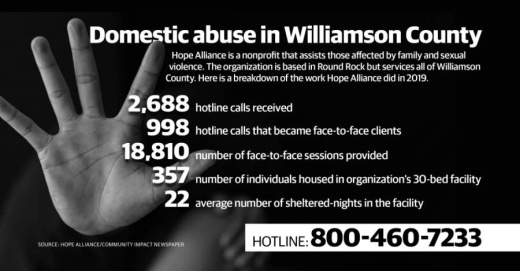Instead, he said, he and his counterparts in other domestic abuse organizations believe they will see a spike when victims are no longer restricted to their homes with their abusers.
“We think that when the stay-at-home orders are lifted—that we're all going to start receiving spikes in the volume of calls and [in] the number of people who finally make the decision that it's time to leave their cycle of violence and find a newer and better way of life,” Brown said.
Hope Alliance is a nonprofit that assists those affected by family and sexual violence by providing services and safety, according to its website.
In 2019, the organization fielded 2,688 hotline calls; 998 of those became face-to-face clients, with whom 18,810 face-to-face sessions were held, he said. He added this does not include the 1,000-plus people Hope Alliance had to refer to other organizations due to capacity.
“The problem is big and isn't going away,” Brown said. “Our numbers increase every year.”
Brown added that while the number of calls are not increasing with the stay-at-home orders in effect, the severity of the cases are, as stressors related to the virus, such as job loss or financial strain, are worsening the abuse.
“The calls that we are receiving [since the start of the stay-at-home orders] have more urgency to them,” Brown said. “People are a little bit more—perhaps ‘desperate’ is the word.”
Brown said he believes the spike will occur after the order is lifted because victims are not able to call and ask for help with their abusers in the same room, as that could increase the severity of the abuse. He added victims are most vulnerable when they decide to leave the abuse, as the abuser may try to intimidate them more or create more harm ,whether it be physical, emotional or financial.
"The calls aren't coming in as rapidly or in the volumes that you might expect right now because [victims] are sheltered at home with the abuser, and they know that things will get even worse for them if they attempt to make that call," he said.
Brown said about 7%-7.5% of Hope Alliance's clients are Georgetown residents; that represents about 200 of the roughly 2,800 clients the organization serves.
Georgetown Police Department data shows the number of domestic disturbance calls has also remained relatively steady, but there has been a slight increase since the stay-at-home order went into effect.
Between Dec. 30, 2019, and April 19, 2020, GPD responded to 264 domestic disturbance calls over 16 weeks, an average of 16.5 calls per week. GPD saw its lowest number of calls, at 10, during the week of Feb. 24, and the highest number of calls, at 25, came during the week of March 30. The Williamson County ‘Stay Home Stay Safe’ order went into effect March 24 and expires at 11:59 p.m. April 30.
Like Brown, GPD Assistant Chief of Police Cory Tchida said while GPD is not seeing an increase in domestic disturbance calls, it does not mean that it is not happening.
“[Victims] don't want a spouse or a loved one to get in trouble. They don't want them to lose their job. They're afraid,” Tchida said. “So the numbers we see of people calling in aren't necessarily indicative of what's actually occurring.”
Brown said while the cycle of abuse can be hard to leave, more than 90% of Hope Alliance clients do succeed in achieving a better way of life. He added that abuse is not something people have to live with their entire lives.
“The fact of the matter is that nobody in the general public really likes to talk about the fact that there is domestic violence and sexual assault. It’s like society's dirty little secret,” Brown said. “The only way to start decreasing the number of incidents is to bring it out into the open to talk about it and for people to hear how bad some of the abuse is that our clients have to have to deal with.”
HOPE Alliance's hotline number is 800-460-7233.





